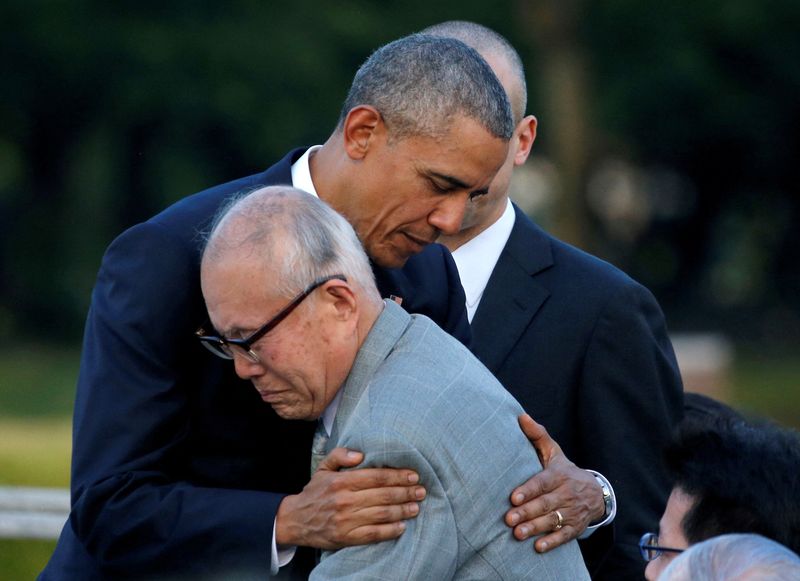By Sakura Murakami
HIROSHIMA, Japan (Reuters) - The last time a U.S. president visited Hiroshima, atomic bomb survivor Shigeaki Mori was filled with hope for a future without nuclear weapons. Seven years later, he's more sceptical.
As leaders of the Group of Seven (G7) nations gather in the Japanese city this week for a summit, Prime Minister Fumio Kishida wants a pledge on nuclear disarmament.
Kishida, who represents Hiroshima, said he chose it for the summit to focus attention on nuclear weapons. But the venue has also highlighted a significant shift in global security since 2016, when Barack Obama became the first incumbent U.S. president to visit.
For the West, Russia's Ukraine invasion has emphasised the importance of nuclear deterrence. Moscow has said it is ready to use its nuclear arsenal to defend its "territorial integrity" if necessary.
Many of Japan's "hibakusha" - atomic bomb victims whose average age is 85 - worry the summit may be a final chance to call for disarmament. They fear Hiroshima's legacy - its importance as the first city to be flattened by a nuclear weapon - may be reduced to a historical artefact rather than a call for change.
"I want to see the leaders commit to getting rid of nuclear weapons," Mori, 86, said in an interview. "I also know it's very hard to get them to go that far."
Kishida, long on the dovish wing on Japan's ruling party, delivered the biggest defence spending increase in Japan's post-war history last year, as Russia's invasion of Ukraine stoked fears of an attack by China on neighbouring Taiwan.
Japan gave up the right to wage war after World War Two and maintains self-defence forces. It relies on the United States for protection.
Japanese are more likely aware they have to tolerate a "nuclear umbrella," said Noriyuki Kawano, head of Hiroshima University's Center for Peace.
"The ideal of a nuclear-free world and the reality of living under a nuclear umbrella coexist," he said. "There is still a coexistence, but we might be seeing a tip in those scales now" towards a more pragmatic view, he said.
Some 51% Japanese supported an increase in the defence budget, and 55% agreed on the need for counter-strike capabilities, according to a poll by broadcaster NHK in December.
KNOCKED UNCONSCIOUS
Mori, eight years old when the bomb hit on the morning of August 6, 1945, was knocked unconscious by the blast. When he came to, he saw a crouched woman holding her own entrails asking for the nearest hospital.
Thirty years later he began a multi-decade quest to find how many victims were cremated at his school playground. His work also unearthed the identities of 12 Americans who died in the bombing.
Obama spoke of the "shared responsibility to look directly in the eye of history" when he visited Hiroshima, and praised Mori's work in his speech.
The moment of Mori being embraced by Obama at the bomb site became the defining image of the visit. Obama avoided any direct expression of remorse or apology for the bombings, something many Japanese feel is overdue.
"I just don't want all of this to end up being a dream," Mori said of his hopes for disarmament.
President Joe Biden is unlikely to deliver an independent message on disarmament during the summit, U.S. officials said, although he will visit the site.
Biden has already pledged a new nuclear deterrence plan with South Korea to counter North Korea.
A U.S. official said Washington was not pushing an independent agenda on the issue, adding Japan was leading discussions.
Senior German government sources did not list nuclear disarmament as a high priority, saying at the G7 it was "important mainly for Japan".
DELICATE BALANCE
One senior European G7 source described the delicate balance between a desire for eventual disarmament and the reality of security.
"The final objective is a world without nuclear weapons, but also we can't be naive and disarm today knowing that we are more than ever dependent" on deterrence, the source told Reuters.
In addition to Russia concerns, officials from the U.S. and its allies have been searching for ways to curb nuclear programmes in Iran and North Korea.
"We recognise that the current international landscape is very challenging given Russia's threat to use nuclear weapons," one Japanese government official said. "That doesn't mean we will give up, especially because Prime Minister Kishida is committed to pursuing this goal."
Elderly hibakusha often talk about seeing a world free of nuclear arms, said survivor Masashi Ieshima, who now lives in Tokyo.
"But to be honest there's a despair behind the brave faces we put on too, that we may not get to see that during our lifetimes," he said.
Without real change, Hiroshima risked becoming just a publicity platform for Kishida, he said.
"Then what's the point of doing this in Hiroshima at all?"
